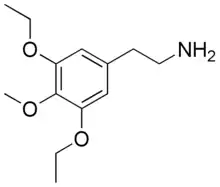Symbescaline
 | |
| Names | |
|---|---|
| Preferred IUPAC name
2-(3,5-Diethoxy-4-methoxyphenyl)ethan-1-amine | |
| Identifiers | |
CAS Number |
|
3D model (JSmol) |
|
| ChEMBL | |
| ChemSpider | |
PubChem CID |
|
CompTox Dashboard (EPA) |
|
InChI
| |
SMILES
| |
| Properties | |
Chemical formula |
C13H21NO3 |
| Molar mass | 239.311 g/mol |
Except where otherwise noted, data are given for materials in their standard state (at 25 °C [77 °F], 100 kPa). | |
| Infobox references | |
Symbescaline, or 3,5-diethoxy-4-methoxyphenethylamine, is a lesser-known psychedelic drug. It is an isomer of asymbescaline. Symbescaline was first synthesized by Alexander Shulgin. In his book PiHKAL (Phenethylamines i Have Known And Loved), the dosage is listed as 240 mg, and the duration listed as unknown. Symbescaline causes few effects, which include alertness and a threshold. Very little data exists about the pharmacological properties, metabolism, and toxicity of symbescaline.
See also
- Phenethylamine
- Psychedelics, dissociatives and deliriants
- Thiosymbescaline
External links
This article is issued from Offline. The text is licensed under Creative Commons - Attribution - Sharealike. Additional terms may apply for the media files.